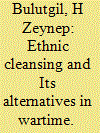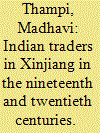| Srl | Item |
| 1 |
ID:
152919


|
|
|
|
|
| Summary/Abstract |
According to the extant literature, state leaders pursue mass ethnic violence against minority groups in wartime if they believe that those groups are collaborating with an enemy. Treating the wartime leadership of a combatant state as a coherent unit, however, is misleading. Even in war, leaders differ in the degree to which they prioritize goals such as maintaining or expanding the territory of the state, and on whether they believe that minority collaboration with the enemy influences their ability to achieve those goals. Also, how leaders react to wartime threats from minority groups depends largely on the role that political organizations based on non-ethnic cleavages play in society. Depending on those cleavages, wartime minority collaboration may result in limited deportations and killings, ethnic cleansing, or minimal violence. A comparison of the policies of three multinational empires toward ethnic minority collaborators during World War I—the Austro-Hungarian Empire and Italians, the Ottoman Empire and Armenians, and the Russian Empire and Muslims in the South Caucasus—illustrates this finding.
|
|
|
|
|
|
|
|
|
|
|
|
|
|
|
|
| 2 |
ID:
108230


|
|
|
|
|
| Publication |
2010.
|
| Summary/Abstract |
The presence of Indian traders in Xinjiang is largely discounted as a factor of significance when analyzing the relations between India and China in the modern era. However, hundreds of Indian sojourners and settlers were present in the main towns and surrounding areas of southern Xinjiang over a period of several centuries until the middle of the twentieth century. This article explores how the rivalry between the expanding British Indian and Russian empires, as well as the turbulent politics of the Republican era in China, placed insurmountable difficulties in the way of this once-resilient group of Indian merchants, eventually leading to their complete exodus from this region of China by the late 1940s.
|
|
|
|
|
|
|
|
|
|
|
|
|
|
|
|